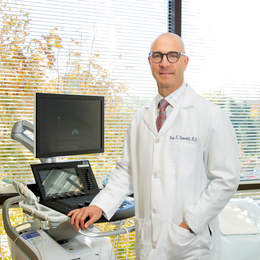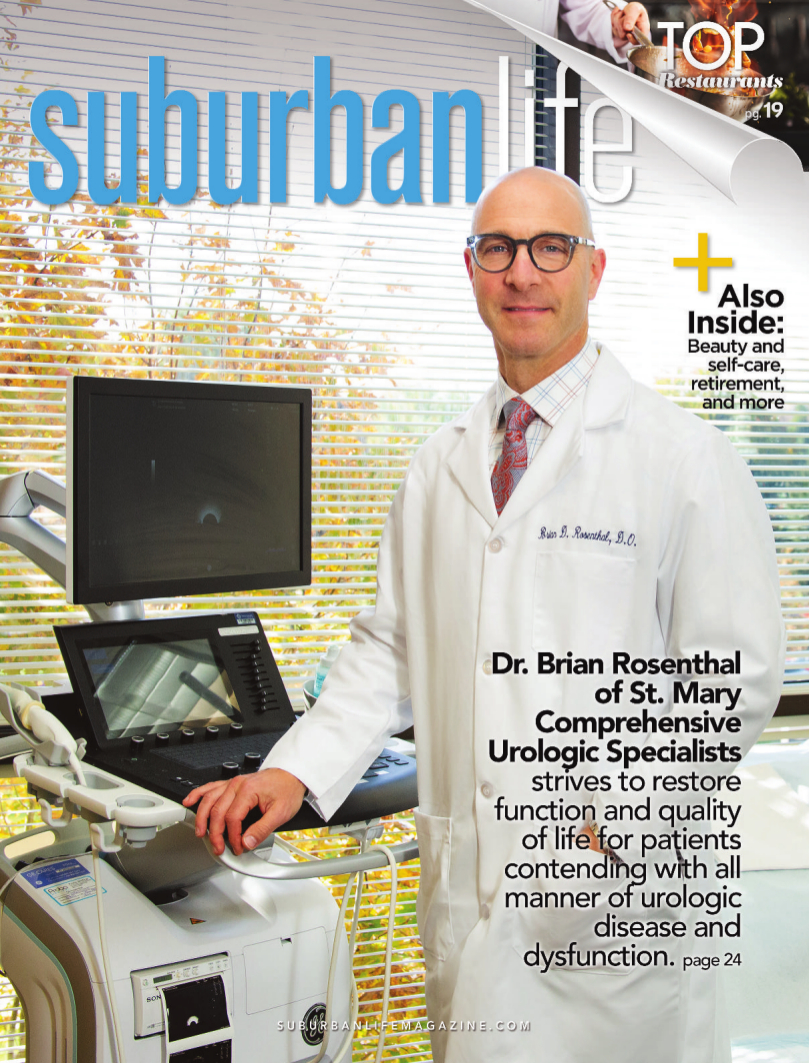
Return to Form
Dr. Brian Rosenthal of St. Mary Comprehensive Urologic Specialists strives to restore function and quality of life for patients contending with all manner of urologic disease and dysfunction.
A patient with an enlarged prostate sat before urologist Brian Rosenthal, D.O., FACOS, at the edge of his seat, hoping for good news. Unresolved urinary issues commonly associated with the patient’s condition—inability to urinate, waking during the night to urinate, incontinence—were negatively impacting his life. Treatments prescribed by other urologists provided partial or temporary relief at best.
“He said he’d seen several doctors over the past few years, but just wasn’t having good results,” Dr. Rosenthal recalls. “Something would work for six months, but then the symptoms would come back. What I did was look at what those doctors did a second and third time and not go down those same pathways. I treated him as a new undiagnosed patient, started over, did a workup on him, and resolved the problem.”
Such is the high degree of expertise and caring Dr. Rosenthal delivers to patients as a physician of St. Mary Comprehensive Urologic Specialists in Langhorne. He and his colleagues have extensive experience in the detection, diagnosis, and treatment of urologic cancers, including prostate, bladder, kidney, ureteral, adrenal gland, and testicles. Nationally recognized in robotic surgery, St. Mary also has the capability to perform minimally invasive treatment for kidney stone disease, erectile dysfunction, incontinence, and other urologic disorders.
Dr. Rosenthal is an expert in robotic and minimally invasive urologic surgery for tumors of the kidney, ureter, and prostate. He also treats common conditions in women such as severe urinary dysfunction, as well as all patients for non-malignant urologic diseases. He notes key advancements in urologic procedures from which patients have benefited.
For example, he lauds genetic testing for cancers, which has led to dramatic progress in therapeutics for treating prostate, kidney, and bladder cancers. As an alternative to chemotherapy, these therapeutics have the potential to help patients return to normal function, with few side effects.
Perhaps the most impactful advancement has been the use of robotic surgery in procedures such as prostatectomy (removal of the prostate), partial and radical nephrectomy (removal of part or all of the kidney), and pyeloureteroplasty (removal and reconstruction of part of the urinary tract). With robotic surgery, a specially trained urologist such as Dr. Rosenthal can perform delicate procedures using highly precise motions and increased magnification. Benefits to the patient include minimal blood loss and a very small incision, thereby contributing to a quicker recovery.
A native of Montgomery County, Dr. Rosenthal attended medical school and completed his internship at the Philadelphia College of Osteopathic Medicine (PCOM). He completed his residency in general surgery at Einstein Medical Center in Philadelphia, and his residency in urology at PCOM and Einstein, where he was chief resident. He gained additional training in urologic oncology and pediatric urology at the Cleveland Clinic Foundation and the Children’s Hospital of Philadelphia.
Dr. Rosenthal is certified by the American Osteopathic Board of Surgery and is a fellow of the American College of Osteopathic Surgeons. He is a member of the American Urological Association, the American College of Osteopathic Surgeons, the American Medical Association, the American Osteopathic Association, the Pennsylvania Osteopathic Medical Association, and the Large Urology Group Practice Association. He has received many awards, including the prestigious Pfizer Scholars in Urology award for excellence in urology.
When asked why he chose a career in medicine, Dr. Rosenthal gives credit to his mother, who had urged both him and his brother at a young age to become physicians. He went to college with the intention to follow her advice and eventually realized he wanted to be a surgeon.
“The father of one of my lab partners in medical school was a urologist,” Dr. Rosenthal recalls. “He came in one Saturday and taught us about urology, and it interested me. When I went into rotations in my third and fourth years in med school, I did urology and loved it: doing procedures; treating patients for bladder, kidney, or prostate issues; helping them live their lives unaffected, and helping maintain their lifestyle.
“It’s always nice to be able to fix patients,” he continues. “When I do, and hearing them say thank you, it feels great. Even better is hearing from a friend of the patient who tells me the patient can’t stop raving about you because you fixed their X, Y, or Z. Those things are always so good to hear.”
St. Mary Comprehensive Urologic Specialists
1203 Langhorne-Newtown Road
St. Clare Building, Suite 225
Langhorne, PA 19047
(215) 710-4490
www.trinityhealthma.org
1203 Langhorne-Newtown Road
St. Clare Building, Suite 225
Langhorne, PA 19047
(215) 710-4490
www.trinityhealthma.org
Photo by Alison Dunlap
Published (and copyrighted) in Suburban Life, October 2023.



